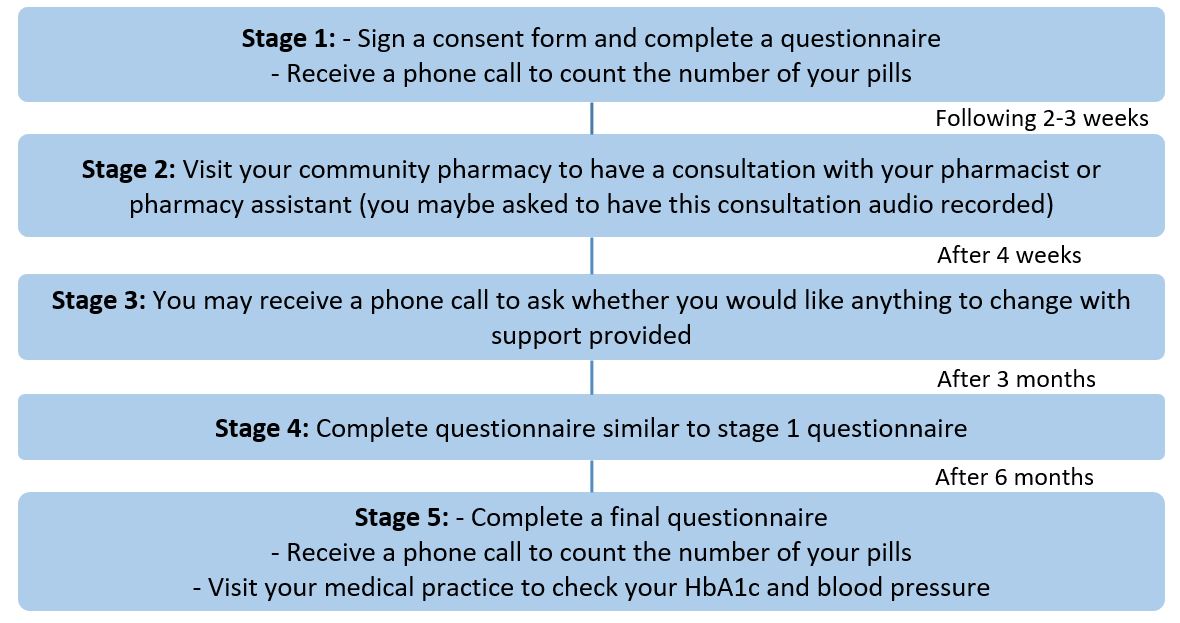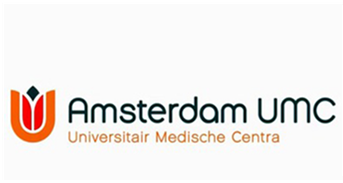
What is the study about?
We know that all sorts of things can get in the way of taking medicines as prescribed. We want to know what gets in the way of taking medicines for diabetes and high blood pressure. We also want to find out if we can help people by using things like messages to their smartphone.
Who is conducting this study?
The European Foundation for the Study of Diabetes is paying for the study. The University of East Anglia (UEA) together with the Amsterdam University Medical Center, University of Oxford, and NHS North Norfolk are conducting the study.
Who will our participants be?
Participants will be invited to take part if they are a registered patient with a medical practice and a community pharmacy that is involved in the study and they are prescribed medicines for diabetes.
If the participant wants to be involved
They will let their usual community pharmacy team know, by either telephoning them or by completing the “Expression of interest” form that will have been sent to them with an information leaflet, and taking it to the pharmacy. The pharmacy assistant will collect some details to make sure they are suitable for the study. If the patient is not suitable (for example they only take insulin for their diabetes, or they do not have access to a computer or a smartphone), the pharmacy assistant will only keep details of their age, gender and reason for not being suitable.
If they are included in the study, we will keep a record of their contact details, age and gender. We will also let their general practitioner (GP) know that they are taking part in this study.
What happens for those agreeing to take part?
We won’t change any of their medicines and their doctor will provide care in the usual way. The study happens in five stages:
Stage 1 We will ask participants to sign a consent form and fill in a questionnaire which should take about 20 minutes. These will sent according to the participant’s preference, either by post (with a prepaid envelope) or by email (to complete and submit electronically). The questionnaire asks for information about the participant’s health and wellbeing and their thoughts on medicines. We are interested in people with diabetes who are finding that things get in the way of taking their medicines as prescribed. The participants will then get a phone call from us to ask them to count how many of your diabetes and blood pressure tablets they have at home. This will help us to find out later whether we have been able to help them to better take their medicines. We will also ask participants to contact their community pharmacy, which is stage 2.
Stage 2 We will decide randomly e.g. by flipping a coin, whether they will have a discussion with their pharmacist or pharmacy assistant. They will help the participant to access a diabetes information website on their smartphone. The participant may also have a consultation about anything that makes it difficult for them to take their medicines as prescribed. Together they will decide what solutions might be best. This could be things like reminders to their smartphone to take their medicines, information about their medicines or a pill box. They will get this support whilst they are involved in this study which will be for 6 months. To help us monitor the performance of pharmacists and pharmacy assistants, there is a small chance that the participant will be asked if it is ok to audio record their consultation, but they will be free to say no.
Stage 3 We might telephone the participant after four weeks of getting the extra help with taking their medicines. This phone call will be up to 10 minutes long and will be to get their thoughts on the solutions that have been tried and to find out whether anything needs changing.
Stage 4 After 3 months, the participant will be asked to fill in one questionnaire similar to the one in stage 1.
Stage 5 After 6 months, the participant’s part in the study will end. We will ask them to complete one final questionnaire similar to those in stages 1 and 4. It is slightly longer so may take up to 30 minutes. This is to find out whether any things have changed for the participant regarding taking their medicines. We will telephone them to ask how many of their diabetes tablets they have left and we will collect (from the GP) the results of their most recent blood pressure and HbA1c (test for routine diabetes control). Finally, we may ask the participant if they would like to be involved in an interview about their opinions of being involved in the study.
Process for participants

Are there any benefits to taking part?
We can’t promise that the study will help the participants but the information that we get might help improve care for people with diabetes and high blood pressure. Each participant will get an £8.50 electronic Amazon voucher to cover any internet and mobile phone costs during the study. We will send this voucher by email at the end of the study.
Are there any disadvantages to taking part?
If potential participants don’t think that they have the time to fill in the questionnaires or they don’t like using a smart phone then it might not be right for them to take part.
What about confidentiality?
The UEA is sponsoring this study in the UK. We will collect information from participants and their medical records. This information will include their name, date of birth, and contact details. We (i.e. study team) will use this information to do the study and to check their records to make sure that the study is being done properly. If the participant is interviewed by telephone, a member of the study team will type up the recording using a secure, password protected computer at the UEA. The UEA will keep any information that might allow participants to be identified (name, date of birth, contact details) for one year after the study has finished. This is so that we can let them know how the study went. Paper copies of anything that might allow them to be identified will be kept in a locked filing cabinet at the School of Pharmacy at the UEA and only accessed by members of the study team. We will be the data controller for this study which means that we are responsible for looking after participant information and using it properly. Participant rights to access, change or move their information is limited, as we need to manage their information in specific ways in order for the study to be reliable and accurate. If a participant withdraws from the study, we will keep the information about them that we have already collected. To safeguard their rights, we will use the minimum personally-identifiable information possible. People who do not need to know who participants are will not be able to see any names or contact details - participant data will have a code number instead.
More details about how the UEA manages Personal Data can be obtained by contacting the UEA Data Protection Team (dataprotection@uea.ac.uk). Principles of the General Data Protection Regulations 2018 will be followed with respect to data storage, processing, and destruction. There will be no access to personally-identifiable data for audit or monitoring purposes. If participants are offered and decide to use an online self-help program, information entered into this program will be stored on a secured third party data storage platform. After the end of the study, some of their information will be sent to the Amsterdam University Medical Center (VUmc) and the Academic Medical Center (AMC) in the Netherlands. They must follow our rules about keeping participant information safe. We will only give them the study information for it to be analysed for the purpose of answering the study questions of this research. We will not give them any information that allows individuals to be identified. They will store the information for 15 years according to EU-regulations for protecting personal data. Research data will be stored in locked cabinets (paper data), and on the Vumc server (digital data). Data will only be accessible to researchers and other people who are according to Dutch law allowed to access the data.
What will happen if a participant doesn’t want to carry on with the study?
If a participant changes their mind, they can withdraw from the study at any time without giving a reason. Withdrawal from the study will not affect the ordinary course of their medical care or treatment.
What happens when the study ends?
Any solutions that involved the participant’s smart phone will stop so they will need to arrange a consultation with their pharmacist or GP to discuss alternative solutions. We will publish what we learn from the study in scientific journals and news articles for the public. We might use direct quotes from interviews but will remove any information that would allow a person to be identified such as names of people, community pharmacies or general practices. Instead we will use a reference number for each person, pharmacy and medical practice. The study findings might be used to help the NHS make decisions about better supporting people taking medicines for diabetes.
Who has reviewed the study?
This study has been reviewed and approved by NHS research Ethics Committee, which is committed to protect the rights, safety, dignity and wellbeing of research participants. The IRAS number is 270673.
)
)
)
Dr Petra Elders
Amsterdam UMC
)
Dr Jacqueline Hugtenburg
Amsterdam UMC
)
Mrs Marlous Langendoen-Gort
Amsterdam UMC
)
Dr Hiyam Al-Jabr
University of East Anglia
)
Ms Daniëlle Huijts
Amsterdam UMC
)
Mrs Caroline Hill
University of East Anglia
Participating Universities



For more information
Contact the lead researcher
Professor Debi Bhattacharya on 01603 593391
COVID-19
The INTENSE study continues to operate as normal through the Coronavirus period. Our researchers are all working remotely to maintain our usual service levels. The project has been designed to unsure the safety of all participants and staff involved though the use of remote communication wherever possible. If you have any concerns or would like to discuss this further please contact us.
Caroline.Smith@uea.ac.uk

)